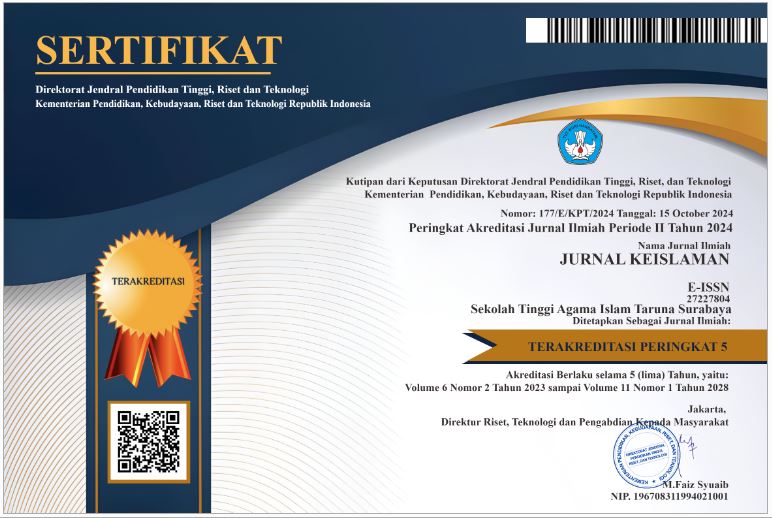Hubungan antara Tingkat Pemahaman Pendidikan Agama Islam dengan Penggunaan Program Dana Talangan Haji dan Umroh
DOI:
https://doi.org/10.54298/jk.v8i2.440Keywords:
Islamic Religious Education, Advance Fund, Hajj UmrahAbstract
This study aims to see the relationship between the level of Islamic religious education and the use of the Hajj and Umrah hand fund program at PT. Hanan Nusantara. This study is a quantitative approach study with the type of correlation. This study is a population study using Saturated Sampling, namely all students totaling 40 Umrah pilgrims in the January period and 10 Hajj pilgrims. This study is a type of correlation research using a Likert scale questionnaire. The type of questionnaire used is a closed questionnaire which in its preparation uses the Likert Scale model. To answer the formulation of the problem, the data will be analyzed descriptively quantitatively with a percentage. While to answer the third problem formulation, the data will be analyzed statistically using the Product Moment correlation technique. The results of this study showed that the level of understanding of Islamic religious education of the Jama'ah PT. Hanan Nusantara is in the good category. Then the use of the Hajj and Umrah hand fund program at PT. Hanan Nusantara is in the good category. Furthermore, there is a significant relationship between the level of understanding of Islamic religious education and the use of the Hajj and Umrah advance fund program at PT. Hanan Nusantara. This can be seen from the probability results of 0.018. Therefore, p <0.05 (0.018 <0.05) then H0 is rejected and Ha is accepted. This means that there is a significant relationship between the level of understanding of Islamic religious education and the use of the Hajj and Umrah advance fund program at PT. Hanan Nusantara.
Downloads
References
Alfiyanti, Ulfah, Achmad Firdaus, and Dede Abdul Fatah. “Hajj Financial Management in the Maqāṣid Sharī’ah Perspective.” Al-Ahkam 29, no. 2 (2019): 203–32. https://doi.org/10.21580/ahkam.2019.29.2.3893.
Amri Darwis, Metode Penelitian Pendidikan Islam : Pengembangan Ilmu Berparadigma Islam, Jakarta : Rajawali Pers, Edisi I. Cet I. 2014.
Ato‟Khurrohman. “Analisis Hukum Islam Terhadap Praktik Akad Qard Wal Ijarah Pada Pembiayaan Dana Talang Haji.” Universitas Wahid Hasyim Semarang, 2020.
Awaludin. “Pengaruh Pendidikan Dan Perilaku Keagamaan Terhadap Penggunaan Bank Syariah (Studi Kasus Di Desa Cintamanik Kecamatan Cigudeg Kabupaten Bogor).” Skripsi, Universitas ISlam Negeri Syarif Hidayatullah Jakarta, 2017, 1–66.
Chenaker, Zakia, and Samiha Bouhafs. “Effectiveness of Hajj Cost Management by Tabung Haji and Lessons Learned for National Office for Hajj and Umrah.” Economic Researcher Review 12, no. 2 (2020): 273–90.
Fakhruddin, M., and Moh. Zaenal Abidin Eko Putro. “Decline and Innovation of Umrah Agencies During Pandemic: A Beck’S Risk Society Perspective.” Harmoni 23, no. 1 (2024): 35–52. https://doi.org/10.32488/harmoni.v23i1.736.
Farid, Muhammad Rif’at Adiakarti. “Model Garbage Can Dan Dana Talangan Haji (Studi Kritik Kebijakan Penyelenggaraan Ibadah Haji).” UIN Sunan Kalijaga Yogyakarta, 2018. https://doi.org/10.13140/RG.2.2.32370.32961.
Fasa, Muhammad Iqbal, Adib Fachri, Ghina Ulfah Saefurrohman, Ahmad Hazas Syarif, and Suharto Suharto. “Economic Protection Toward Financial Management Hajj Funds: Indonesian Case.” Ad-Deenar: Jurnal Ekonomi Dan Bisnis Islam 4, no. 02 (2020): 163. https://doi.org/10.30868/ad.v4i02.953.
Handoko, Luqman Hakim. “Implementation of Fatwa on Hajj Bailout Fund in Islamic Financial Institutions : A Systematic Literature Review Using PRISMA Approach.” Al-Falah : Journal of Islamic Economics 9, no. 2 (2024): 109–28.
Mahfudloh, Filla Apriliani, Sayyida Amalina, and Rahmawati. “The Influence of Inflating and the Rupiah Exchange Rate on the Survival of Hajj Costs in Surabaya (2012-2022).” Jurnal Al Iqtishad 20, no. 1 (2024): 66–83.
Mahmudi, Mohammad, and Khairul Jannah. “Analisis Akad Ijarah Multijasa Dalam Pembiayaan Haji Dan Umroh Amitra Syariah Malang.” Journal of Economic and Islamic Research 2, no. 1 (2023): 83–96. https://doi.org/10.62730/journalofeconomicandislamicresearch.v2i1.78.
Muhammadiyah, Universitas, and Sumatera Barat. “Transformative Shifts : From Puritanical Rigidities to Cosmopolitan Flexibilities in Islamic Education” 3, no. 2 (2024): 186–95.
Rusydiana, Aam Slamet, Muhammad Syafii Antonio, Aisyah Assalafiyah, and Akhmad Yusup. “Hajj Investment Fund: A Bibliographic Study of the Hajj Economy.” International Journal of Religious Tourism and Pilgrimage 9, no. 1 (2021): 132–46.
Samsudin, Abdul Aziz, Roqiyul Ma’arif Syam, M. Zidny Nafi Hasbi, and Anton Satria Prabuwono. “Hajj Funds Management Based on Maqāṣid Al-Sharī’ah; A Proposal for Indonesian Context.” Al-Ihkam: Jurnal Hukum Dan Pranata Sosial 18, no. 2 (2023): 544–67. https://doi.org/10.19105/al-lhkam.v18i2.7268.
Sopa, and Siti Rahmah. “Evaluasi Talangan Umroh.” Ahkam 8, no. 2 (2013): 303–14.
Sugitanata, Arif. “Jurnal Keislaman.” Pembaharuan Konsep Kafa’Ah Dalam Perkawinan 4, no. 2 (2017): 9–15.
Taufiq, M, Dewi Puspita Sari, Ali Ridho, and Irwan Mohd Sobri. “Termination of Hajj Initial Deposit Financing Products for Hajj Pilgrimage Organization Costs: Normative Legal Analysis.” SHAHIH: Journal of Islamicate Multidisciplinary 9, no. 1 (2024). https://doi.org/10.22515/shahih.v9i1.9625.
Downloads
Published
How to Cite
Issue
Section
License
Copyright (c) 2025 Yulianto

This work is licensed under a Creative Commons Attribution-ShareAlike 4.0 International License.
Authors who publish with this journal agree to the following terms:
- Authors retain copyright and grant the journal right of first publication with the work simultaneously licensed under a Creative Commons Attribution-ShareAlike 4.0 that allows others to share the work with an acknowledgement of the work's authorship and initial publication in this journal.
- Authors are able to enter into separate, additional contractual arrangements for the non-exclusive distribution of the journal's published version of the work (e.g., post it to an institutional repository or publish it in a book), with an acknowledgement of its initial publication in this journal.
- Authors are permitted and encouraged to post their work online (e.g., in institutional repositories or on their website) prior to and during the submission process, as it can lead to productive exchanges, as well as earlier and greater citation of published work (See The Effect of Open Access).


















